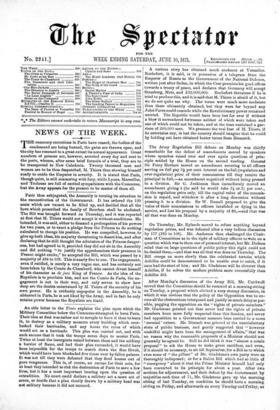An able letter in the Times explains the plan upon
which the Military Committee below the Commune attempted to burn Paris. Their idea at first was rather not to scruple to burn it than to burn it, to destroy as a military measure every building which over- looked their barricades, and any house the ruins of which would act as a barricade. This plan was carried out, and with such success that it took the troops seven days to master Paris. Twice at least the insurgents raised between them and the soldiery a barrier of flame, and had their plan succeeded, it would have been impossible for the troops to march down the Rue Rivoli, which would have been blockaded five times over by fallen palaces. It was not till they were defeated that they fired houses out of pure vengeance. This is, of course, no excuse for their acts, for at least they intended to risk the destruction of Paris to save a few lives, but it has a most important bearing upon the question of extradition. No court could declare a military act a mere act of arson, or decide that a plan clearly drawn by a military head was not military because it did not succeed.


































